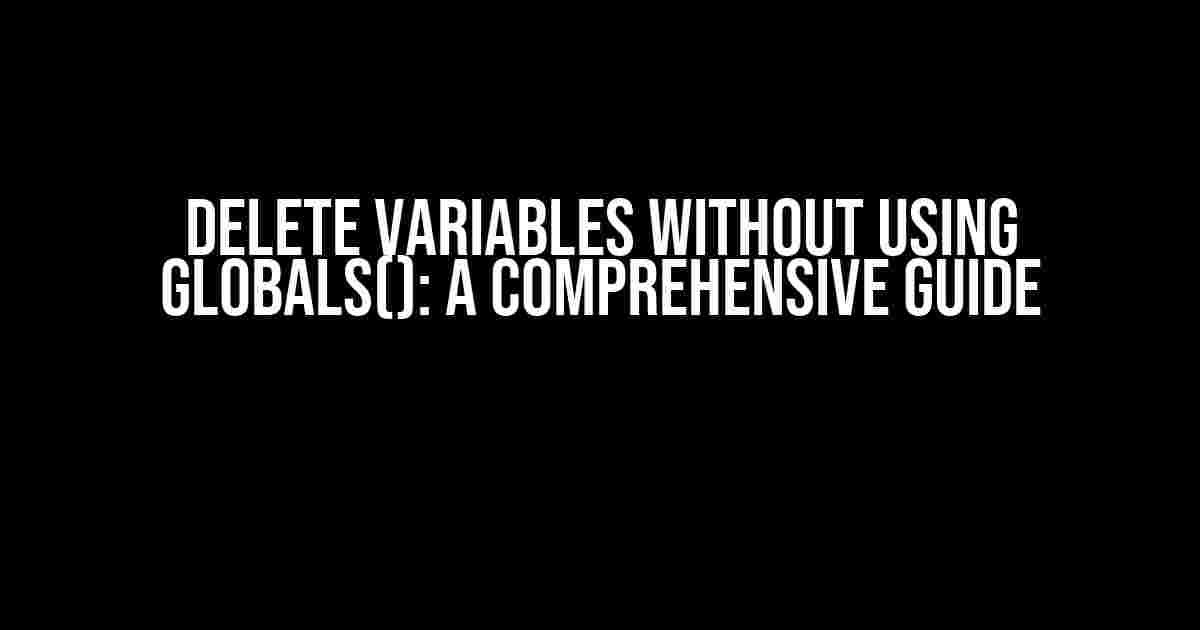Are you tired of dealing with unwanted variables cluttering your Python code? Do you want to learn how to delete variables without relying on the `globals()` function? Look no further! In this article, we’ll explore the world of variable deletion, providing clear instructions and explanations to help you master this essential skill.
The Importance of Deleting Variables
Variables are an essential part of any programming language, allowing us to store and manipulate data. However, as our codebase grows, so does the number of variables. If left unchecked, these variables can lead to:
- Memory leaks: Unused variables can occupy memory, slowing down your program.
- Name conflicts: Duplicate variable names can cause errors and confusion.
- Code clutter: Unnecessary variables can make your code harder to read and maintain.
Deleting variables is crucial to maintaining a clean, efficient, and easy-to-understand codebase. But, what if you don’t want to use the `globals()` function? Fear not, dear reader, for we have you covered!
The `del` Statement: A Gentle Introduction
The `del` statement is a powerful tool for deleting variables in Python. It’s a straightforward way to remove variables from memory, but it does come with some caveats. Let’s dive in!
# Define a variable
my_variable = 10
# Print the variable
print(my_variable) # Output: 10
# Delete the variable
del my_variable
# Try to print the variable again
print(my_variable) # Error: NameError: name 'my_variable' is not definedAs you can see, using `del` is a simple process. However, things can get a bit more complicated when dealing with lists, dictionaries, and other data structures.
When working with lists, you can use `del` to remove specific elements or even the entire list. Let’s explore some examples:
# Define a list
my_list = [1, 2, 3, 4, 5]
# Delete a specific element
del my_list[1]
print(my_list) # Output: [1, 3, 4, 5]
# Delete the entire list
del my_list
print(my_list) # Error: NameError: name 'my_list' is not definedFor dictionaries, you can use `del` to remove specific key-value pairs or the entire dictionary:
# Define a dictionary
my_dict = {'a': 1, 'b': 2, 'c': 3}
# Delete a specific key-value pair
del my_dict['b']
print(my_dict) # Output: {'a': 1, 'c': 3}
# Delete the entire dictionary
del my_dict
print(my_dict) # Error: NameError: name 'my_dict' is not definedRemember, when deleting variables, make sure you’re targeting the correct scope. Deleting a variable in the wrong scope can lead to unexpected results or errors.
The `del` Statement and Scope
Understanding scope is crucial when using the `del` statement. In Python, scope refers to the region of the code where a variable is defined and accessible. There are two main scopes to consider:
- Local Scope: Variables defined within a function or method have local scope. These variables are only accessible within that specific function or method.
- Global Scope: Variables defined outside of a function or method have global scope. These variables are accessible throughout the entire program.
When using `del`, you need to ensure you’re targeting the correct scope. Deleting a variable in the wrong scope can lead to:
- Error messages: Attempting to delete a variable that doesn’t exist in the current scope will result in an error.
- Unintended consequences: Deleting a variable in the wrong scope can affect other parts of your code, leading to unexpected results or errors.
Examples of Deleting Variables without Using Globals()
Let’s explore some examples of deleting variables without relying on the `globals()` function:
# Define a local variable
def my_function():
my_local_variable = 10
del my_local_variable
my_function() # Local variable deleted successfully
# Define a global variable
my_global_variable = 10
def my_function2():
global my_global_variable
del my_global_variable
my_function2() # Global variable deleted successfullyAs you can see, deleting variables without using `globals()` requires a clear understanding of scope and the `del` statement.
Best Practices for Deleting Variables
To avoid common pitfalls and ensure efficient code, follow these best practices:
- Use meaningful variable names: Avoid using generic names like `x` or `temp`. Instead, use descriptive names that indicate the variable’s purpose.
- Delete variables promptly: Remove variables as soon as they’re no longer needed to prevent memory leaks and code clutter.
- Be mindful of scope: Ensure you’re targeting the correct scope when using `del` to avoid errors or unintended consequences.
- Comment your code: Add comments to explain why you’re deleting variables, making it easier for others (and yourself) to understand your code.
Conclusion
Deleteing variables is an essential skill for any Python programmer. By mastering the `del` statement and understanding scope, you can maintain a clean, efficient, and easy-to-understand codebase. Remember to follow best practices, be mindful of scope, and comment your code to ensure your code is both readable and reliable.
With this comprehensive guide, you’re now equipped to delete variables with confidence, without relying on the `globals()` function. Happy coding!
| Keyword | Explanation |
|---|---|
| "del" | A statement used to delete variables in Python. |
| globals() | A function that returns a dictionary containing all global variables. |
| Scope | The region of the code where a variable is defined and accessible. |
This article has provided a comprehensive guide to deleting variables without using the `globals()` function. By following the instructions and explanations provided, you’ll be well on your way to mastering the art of variable deletion in Python.
Frequently Asked Question
Get the lowdown on deleting variables without invoking globals()!
How do I delete multiple variables in Python without using the globals() function?
You can use the del statement to delete multiple variables in Python. For example, del var1, var2, var3 will delete the variables var1, var2, and var3. Just make sure to separate the variable names with commas!
What happens if I try to delete a variable that doesn’t exist using del?
If you try to delete a variable that doesn’t exist using del, you’ll get a NameError. For example, if you try to delete a variable x that hasn’t been defined, you’ll get a NameError saying “name ‘x’ is not defined”. So, make sure those variables exist before you try to delete them!
Can I use del to delete variables in a list or dictionary?
Nope! del is only used to delete variables, not list or dictionary elements. If you want to delete elements from a list or dictionary, you’ll need to use the appropriate methods, such as list.pop() or dict.pop()!
Is del a function or a statement in Python?
del is a statement in Python, not a function. That means you don’t need to use parentheses after it, and it doesn’t return any value. It simply deletes the variables specified!
Are there any performance implications to using del to delete multiple variables?
No, there are no significant performance implications to using del to delete multiple variables. del is a simple and efficient way to delete variables, and it doesn’t have any major performance implications. So go ahead and use it with confidence!





